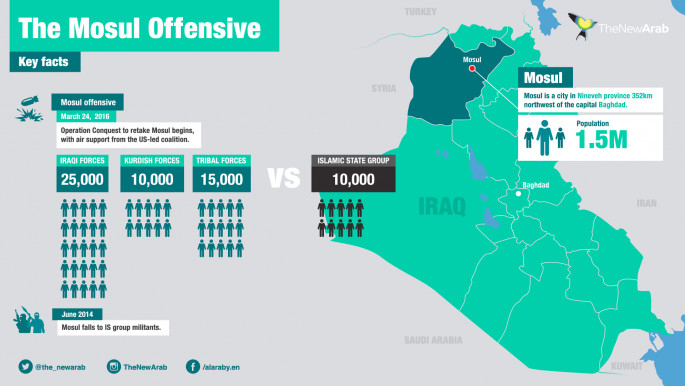Mosul's secretive resistance movement 'grinding down' IS from within
A secretive group of resistance fighters have banded together in the Islamic State group [IS] Iraqi bastion of Mosul, launching lighting-quick ambushes on jihadist fighters.
The resistance within Iraq's second city, which fell to IS militants during the summer 2014, are playing a vital role in the ongoing military campaign to retake Mosul.
"We operated in secrecy for around six months, while we carefully selected members of the group, before we began carrying out attacks," a resistance fighter going by the nom de guerre Hassan al-Mashhadani told The New Arab.
"Several of us have been caught by IS and executed,"
Mashhadani said that over the past two months the resistance has ramped up its attacks, killing dozens of IS fighters.
"These attacks have boosted the moral of locals, who have begun to spread the word of the resistance movement. News of the attacks have encouraged young men to join our ranks and led to locals aiding us in our attacks."
He added that the group is now in communication with the Iraqi military.
 |
The anti-IS resistance is a serious challenge to the jihadists because they know well the layout of their city |  |
Top diplomatic and military officials from the US-led coalition fighting IS met this week to finalise the large-scale assault on the daunting target of Mosul.
Former Colonel Abbas al-Zaidi said the resistance movement's efforts will help the city be recaptured with as few casualties as possible.
"The resistance factions are grinding down IS, which has found itself trapped between the government troops advancing on Mosul and the hidden forces within."
"The resistance fighters are more of a threat to IS because they are from the city, know its layout and the locations of IS troops, making it easier to hunt them down," he added.
Mosul, however, poses a serious political challenge.
The remaining civilian population is mainly Sunni Muslim and deeply distrustful of the Shia-led government in Baghdad.
The city is also near the fracture line between Iraq's autonomous Kurdish region and the Arab centre, a point of tension between the local anti-IS forces.
The challenge facing Iraq is how a post-war Mosul will be rebuilt and governed.
Critically, there has been an agreement that 15,000 locally recruited troops from Mosul's Nineveh province - largely Sunni Arabs - will be involved in the retaking of the city.
This week, the UN humanitarian affairs agency appealed for billions of dollars in funding to assist in containing the looming humanitarian fallout from the battle of Mosul.






 Follow the Middle East's top stories in English at The New Arab on Google News
Follow the Middle East's top stories in English at The New Arab on Google News


